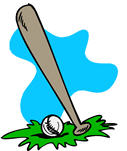 bat
bat

I.bat1 S3 /bæt/ BrE AmE noun [countable]
[Sense 1,5-7: Date: 1500-1600; Origin: back 'bat' (14-16 centuries), probably from a Scandinavian language. ]
[Sense 2-4: Language: Old English; Origin: batt]
1. a small animal like a mouse with wings that flies around at night ⇨ ↑fruit bat
2. 
a) a long wooden stick with a special shape that is used in some sports and games:
a baseball bat
a cricket bat
b) British English a round flat piece of wood with a handle, used to hit a ball in ↑table tennis SYN paddle American English
3. be at bat to be the person who is trying to hit the ball in a game of ↑baseball
4. do something off your own bat British English informal to do something without being told to do it:
She went to see a solicitor off her own bat.
5. do something right off the bat American English informal to do something immediately:
He said yes right off the bat.
6. like a bat out of hell informal very fast:
I drove like a bat out of hell to the hospital.
7. old bat spoken an unpleasant old woman
⇨ as blind as a bat at ↑blind1(1c)
II.bat2 BrE AmE verb (past tense and past participle batted, present participle batting)
[Sense 1, 4-5: Date: 1400-1500; Origin: ⇨ ↑bat1(2)]
[Sense 2-3: Date: 1800-1900; Origin: Probably from bate 'to beat the wings' (13-20 centuries), from Old French batre 'to hit']
1. [intransitive and transitive] to hit the ball with a bat in ↑cricket or ↑baseball
2. not bat an eye/eyelid informal to not seem to be shocked, surprised, or embarrassed:
They started talking about sex, but she didn’t bat an eyelid.
3. bat your eyes/eyelashes if a woman bats her eyes, she opens and closes them several times quickly, in order to look attractive to men
4. go to bat for somebody American English informal to help and support someone
5. be batting a thousand American English informal to be very successful:
She’s been batting a thousand since she got that job.
bat something ↔ around phrasal verb informal
to discuss various ideas or suggestions
b\\bathu
bat
Bats are the only flying mammal.| ◎ | [bæt] | | ※ | danh từ | | | ■ | (thể dục,thể thao) gậy (bóng chày, crikê); (từ cổ,nghĩa cổ) vợt (quần vợt) | | | ■ | vận động viên bóng chày, vận động viên crikê ((cũng) batsman)) | | | ■ | (từ lóng) cú đánh bất ngờ | | | ■ | bàn đập (của thợ giặt) | | | 〆 | to be at bat | | | ✓ | (từ Mỹ,nghĩa Mỹ), (từ lóng) giữ một vị trí quan trọng (đánh bóng chày) | | | ✓ | (nghĩa bóng) giữ vai trò quan trọng | | | 〆 | to carry out one's bat | | | ✓ | thắng, giành được thắng lợi, không bị loại khỏi vòng | | | 〆 | to come to bat | | | ✓ | (từ Mỹ,nghĩa Mỹ), (từ lóng) gặp phải một vấn đề khó khăn hóc búa; phải qua một thử thách gay go | | | 〆 | to go to the bat with somebody | | | ✓ | thi đấu với ai | | | 〆 | off one's own bat | | | ✓ | một mình không có ai giúp đỡ, đơn thương độc mã | | | 〆 | right off the bat | | | ✓ | (từ Mỹ,nghĩa Mỹ) ngay lập tức, không chậm trễ | | ※ | ngoại động từ | | | ■ | (thể dục,thể thao) đánh bằng gậy (bóng chày, crikê) | | ※ | danh từ | | | ■ | (động vật học) con dơi | | | ■ | mù tịt | | | 〆 | to have bats in one's belfry | | | ✓ | gàn, dở hơi | | | 〆 | like a bat out of hell | | | ✓ | thật nhanh, ba chân bốn cẳng | | ※ | danh từ | | | ■ | (từ lóng) bước đi, dáng đi | | | 〆 | at a good (rare) bat | | | ✓ | thật nhanh | | | 〆 | to go full bat | | | ✓ | (từ Mỹ,nghĩa Mỹ) đi thật nhanh, ba chân bốn cẳng | | ※ | ngoại động từ | | | ■ | nháy (mắt) | | | ☆ | to bat one's eyes | | | nháy mắt | | | 〆 | not to bat an eyelid | | | ✓ | không chợp mắt được lúc nào | | | ✓ | cứ điềm nhiên, cứ phớt tỉnh | | ※ | danh từ | | | ■ | (từ Mỹ,nghĩa Mỹ), (từ lóng) sự chè chén linh đình; sự ăn chơi phóng đãng | | | ☆ | to go on a bat | | | chè chén linh đình; ăn chơi phóng đãng |
|
|
